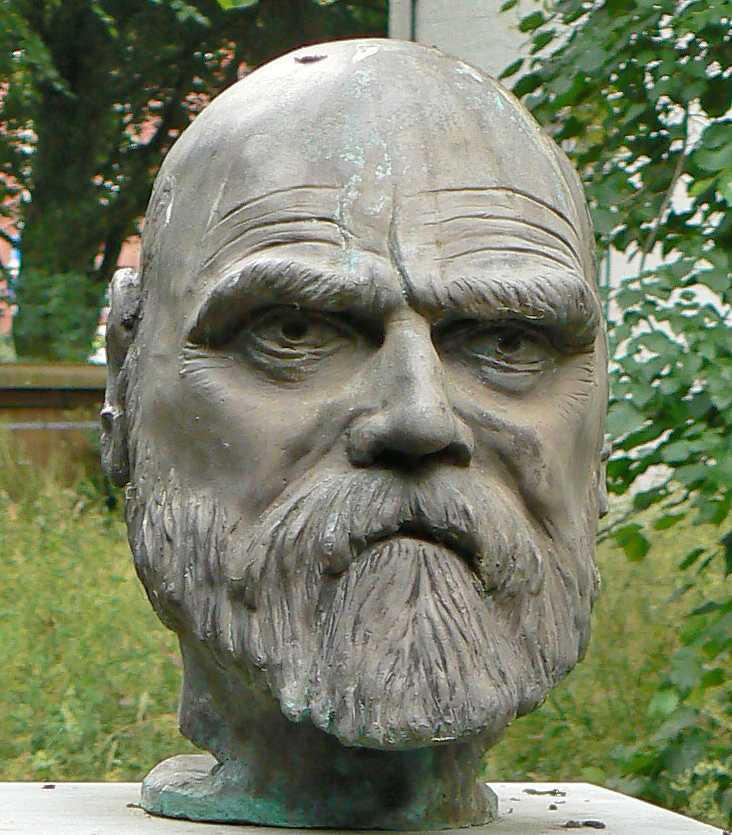|
Helmut Schelsky
Helmut Schelsky (14 October 1912 – 24 February 1984), was a German sociologist, the most influential in post-World War II Germany, well into the 1970s. Biography Schelsky was born in Chemnitz, Saxony. He turned to social philosophy and even more to sociology, as elaborated at the University of Leipzig by Hans Freyer (the " Leipzig School"). Having earned his doctorate in 1935 (thesis r. ''The theory of community in the 1796 natural law by Fichte''), in 1939 he qualified as a lecturer ("''Habilitation''") with a thesis on the political thought of Thomas Hobbes at the University of Königsberg. He was called up in 1941, so did not take up his first chair of Sociology at the (then German) Reichsuniversität Straßburg in 1944. After the fall of the Third Reich in 1945, Schelsky joined the German Red Cross and formed its effective ''Suchdienst'' (service to trace down missing persons). In 1949 he became a Professor at the Hamburg "Hochschule für Arbeit und Politik", in ... [...More Info...] [...Related Items...] OR: [Wikipedia] [Google] [Baidu] |
Hamburg University
The University of Hamburg (german: link=no, Universität Hamburg, also referred to as UHH) is a public research university in Hamburg, Germany. It was founded on 28 March 1919 by combining the previous General Lecture System ('' Allgemeines Vorlesungswesen''), the Hamburg Colonial Institute (''Hamburgisches Kolonialinstitut''), and the Academic College ('' Akademisches Gymnasium''). The main campus is located in the central district of Rotherbaum, with affiliated institutes and research centres distributed around the city-state. The university has been ranked in the top 200 universities worldwide by the ''Times Higher Education Ranking'', the Shanghai Ranking and the CWTS Leiden Ranking, placing it among the top 1% of global universities. Seven Nobel Prize winners and one Wolf Prize winner are affiliated with UHH. On a national scale, '' U.S. News & World Report'' ranks UHH 7th and ''QS World University Rankings'' 14th out of a total of 426 German institutions of higher edu ... [...More Info...] [...Related Items...] OR: [Wikipedia] [Google] [Baidu] |
University Of Cologne
The University of Cologne (german: Universität zu Köln) is a university in Cologne, Germany. It was established in the year 1388 and is one of the most prestigious and research intensive universities in Germany. It was the sixth university to be established in Central Europe. It closed in 1798 before being re-established in 1919. It is now one of the largest universities in Germany with more than 48,000 students. The University of Cologne was a university of excellence as part of the German Universities Excellence Initiative from 2012 to 2019. As of 2021, 3 Nobel Prize winners have been affiliated with the university. Professors and former students have won 11 Leibniz Prizes, the most prestigious as well as the best-funded prize in Europe. History 1388–1798 The university of Cologne was established in 1388 as the fourth university in the Holy Roman Empire, after the Charles University of Prague (1348), the University of Vienna (1365) and the Ruprecht Karl University ... [...More Info...] [...Related Items...] OR: [Wikipedia] [Google] [Baidu] |
Leopold Von Wiese
Leopold Max Walther von Wiese und Kaiserswaldau (2 December 1876, Glatz, German Empire – 11 January 1969, Cologne, West Germany) was a German sociologist and economist, as well as professor and chairman of the German Sociological Association. Biography Leopold von Wiese was the only son of a prematurely deceased Prussian officer and received his education at the cadet schools in Wahlstatt and Lichterfelde. After leaving the cadet corps, he then studied economics at the Friedrich Wilhelm University in Berlin where he got his Ph.D. in 1902. Subsequently, he was scientific secretary of the "Institute for the common good" (''Institut für Gemeinwohl'') in Frankfurt. In 1905, he was Associate Professor of Economics at the University of Berlin. In 1906, he was appointed professor of political science at the Royal Academy in Posen; in 1908, he joined the Technical University of Hannover as a professor of economics and business management. In 1912, he became director of studie ... [...More Info...] [...Related Items...] OR: [Wikipedia] [Google] [Baidu] |
University Of Kiel
Kiel University, officially the Christian-Albrecht University of Kiel, (german: link=no, Christian-Albrechts-Universität zu Kiel, abbreviated CAU, known informally as Christiana Albertina) is a public research university in the city of Kiel, Germany. It was founded in 1665 as the ''Academia Holsatorum Chiloniensis'' by Christian Albert, Duke of Holstein-Gottorp and has approximately 27,000 students today. It is the largest, oldest, and most prestigious university in the state of Schleswig-Holstein. Until 1866, it was not only the northernmost university in Germany but at the same time the 2nd largest university of Denmark. Faculty, alumni, and researchers of Kiel University have won 12 Nobel Prizes. Kiel University has been a member of the German Universities Excellence Initiative since 2006. The Cluster of Excellence The Future Ocean, which was established in cooperation with the GEOMAR Helmholtz Centre for Ocean Research Kiel in 2006, is internationally recognized. The secon ... [...More Info...] [...Related Items...] OR: [Wikipedia] [Google] [Baidu] |
Ferdinand Tönnies
Ferdinand Tönnies (; 26 July 1855 – 9 April 1936) was a German sociologist, economist, and philosopher. He was a significant contributor to sociological theory and field studies, best known for distinguishing between two types of social groups, Gemeinschaft and Gesellschaft (''community and society''). He co-founded the German Society for Sociology together with Max Weber and Georg Simmel and many other founders. He was president of the society from 1909 to 1933, after which he was ousted for having criticized the Nazis. Tönnies was regarded as the first proper German sociologist and published over 900 works, contributing to many areas of sociology and philosophy. Tönnies, Max Weber, and Georg Simmel are considered the founding fathers of classical German sociology. Though there has been a resurgence of interest in Weber and Simmel, Tönnies has not drawn as much attention. Biography Early life He was born on 26 July 1855 on the Haubuarg "De Reap," Oldenswort on ... [...More Info...] [...Related Items...] OR: [Wikipedia] [Google] [Baidu] |
Gotthard Günther
Gotthard Günther (15 June 1900 – 29 November 1984) was a German (Prussian) philosopher. Biography Günther was born in Arnsdorf, Hirschberg im Riesengebirge, Prussian Silesia (modern day Jelenia Góra, Poland). From 1921 to 1933, Günther studied sinology and philosophy at the universities of Heidelberg and Berlin, and wrote his doctor's thesis on Hegel in 1933 under the guidance of Eduard Spranger. From 1935 to 1937, he worked at the institute of Arnold Gehlen at the University of Leipzig, publishing ''Christliche Metaphysik und das Schicksal des modernen Bewusstseins'' (Christian metaphysics and the fate of modern consciousness, together with Helmut Schelsky in 1937). He was a member of the Leipzig School. In the same year, following his wife, the Jewish psychologist Dr. Marie Günther-Hendel, he emigrated from Germany first to Italy, afterwards to Stellenbosch University in South Africa and, in 1940, to the United States. There he completed his system of place-valued log ... [...More Info...] [...Related Items...] OR: [Wikipedia] [Google] [Baidu] |
Arnold Gehlen
Arnold Gehlen (29 January 1904 in Leipzig, German Empire – 30 January 1976 in Hamburg, West Germany) was an influential conservative German philosopher, sociologist, and anthropologist. Biography Gehlen's major influences while studying philosophy were Hans Driesch, Nicolai Hartmann and especially Max Scheler. Furthermore, he was heavily influenced by Immanuel Kant, Arthur Schopenhauer and US-American pragmatism: Charles Sanders Peirce, William James and especially George Herbert Mead. In 1933 Gehlen signed the '' Vow of allegiance of the Professors of the German Universities and High-Schools to Adolf Hitler and the National Socialistic State''. Although he joined the Nazi Party in 1933 and made a career as a member of the ' Leipzig School' under Hans Freyer, he was not a Nazi, but rather a political opportunist: his main work ''Der Mensch'' appeared in 1940 and was published in English translation in 1987 as ''Man. His Nature and Place in the World''. In contrast to ... [...More Info...] [...Related Items...] OR: [Wikipedia] [Google] [Baidu] |
Sociology Of Law
The sociology of law (legal sociology, or law and society) is often described as a sub-discipline of sociology or an interdisciplinary approach within legal studies. Some see sociology of law as belonging "necessarily" to the field of sociology, but others tend to consider it a field of research caught up between the disciplines of law and sociology. Still others regard it as neither a subdiscipline of sociology nor a branch of legal studies but as a field of research on its own right within the broader social science tradition. Accordingly, it may be described without reference to mainstream sociology as "the systematic, theoretically grounded, empirical study of law as a set of social practices or as an aspect or field of social experience". It has been seen as treating law and justice as fundamental institutions of the basic structure of society mediating "between political and economic interests, between culture and the normative order of society, establishing and maintaini ... [...More Info...] [...Related Items...] OR: [Wikipedia] [Google] [Baidu] |
Frankfurt School
The Frankfurt School (german: Frankfurter Schule) is a school of social theory and critical philosophy associated with the Institute for Social Research, at Goethe University Frankfurt in 1929. Founded in the Weimar Republic (1918–1933), during the European interwar period (1918–1939), the Frankfurt School initially comprised intellectuals, academics, and political dissidents dissatisfied with the contemporary socio-economic systems (capitalist, fascist, communist) of the 1930s. The Frankfurt theorists proposed that social theory was inadequate for explaining the turbulent political factionalism and reactionary politics occurring in 20th century liberal capitalist societies. Critical of both capitalism and of Marxism–Leninism as philosophically inflexible systems of social organization, the School's critical theory research indicated alternative paths to realizing the social development of a society and a nation. The Frankfurt School perspective of critical investigat ... [...More Info...] [...Related Items...] OR: [Wikipedia] [Google] [Baidu] |
Utopianism
A utopia ( ) typically describes an imaginary community or society that possesses highly desirable or nearly perfect qualities for its members. It was coined by Sir Thomas More for his 1516 book '' Utopia'', describing a fictional island society in the New World. However, it may also denote an intentional community. In common parlance, the word or its adjectival form may be used synonymously with "impossible", "far-fetched" or "deluded". Hypothetical utopias focus on—amongst other things—equality, in such categories as economics, government and justice, with the method and structure of proposed implementation varying based on ideology. Lyman Tower Sargent argues that the nature of a utopia is inherently contradictory because societies are not homogeneous and have desires which conflict and therefore cannot simultaneously be satisfied. To quote: The opposite of a utopia is a dystopia or cacotopia. Utopian and dystopian fiction has become a popular literary category. Despi ... [...More Info...] [...Related Items...] OR: [Wikipedia] [Google] [Baidu] |
Rheda, Germany
Rheda is a town in North Rhine-Westphalia, a part of the municipality of Rheda-Wiedenbrück in the '' Kreis'' of Gütersloh. History Rheda was first mentioned in documents from the year 1085, at the latest 1088. Rheda Castle was, from 1170 until 1807 or 1815, the manor house of the Manor of Rheda. The Lordship was created from the ''Freigericht'' (free court or free jurisdiction) of Rheda and the ''Vögterei'' (stewardship) over the abbeys of Liesborn and Freckenhorst. On the death of the first Lord, Widukind of Rheda, in the Third Crusade, the lordship was inherited by Bernhard II, Lord of Lippe. Bernhard's successor, Hermann II, moved the seat of his lordship to Rheda Castle. On the death of Bernhard V without an heir in 1364, the Lordship of Rheda was seized by Bernhard's son-in-law, Otto V, Count of Tecklenburg, unlike the rest of the Lippian inheritance, which passed to Simon III, brother of Bernhard V; Simon III van Lippe on the Dutch Wikipedia 130 years later, ... [...More Info...] [...Related Items...] OR: [Wikipedia] [Google] [Baidu] |





.jpg)
.jpg)